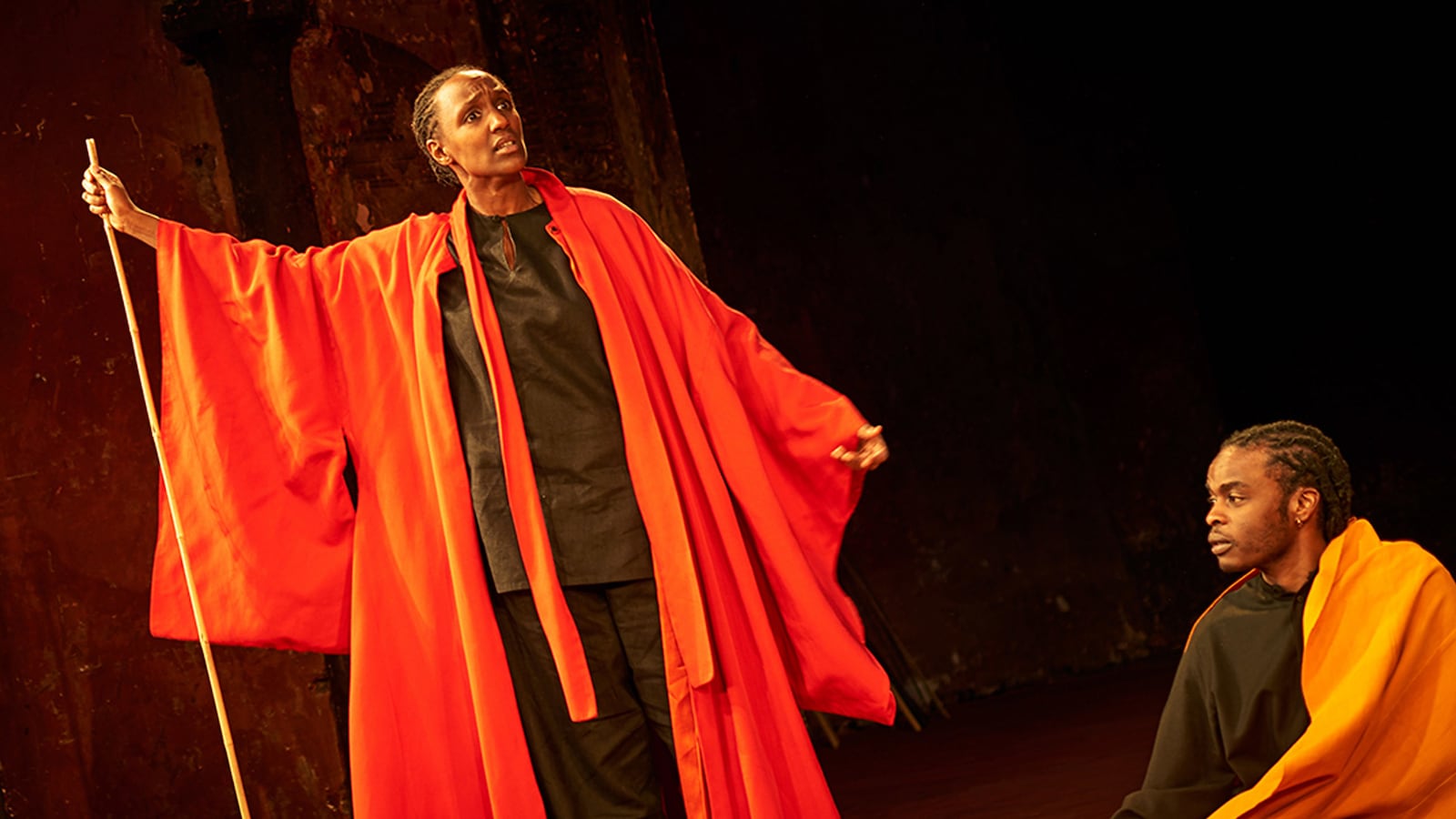Preceding Peter Brook and Marie-Hélène Estienne’s Battlefield at BAM’s Harvey Theater is a piece of theater history: In 1987 the theater, then named the Majestic, was inaugurated by Brook’s nine-hour, sunset-to-sunrise production of the ancient Indian Sanskrit poem The Mahabharata.
Battlefield is a significantly shorter distillation of the central story of the epic, running at around one hour and 15 minutes.
An almost bare stage is furnished by what look like thin strips of wood, and rich, colorful shawls, designed by Oria Puppo, in red and blue—and in dour browns and grays at harsher moments later in the piece. It is staging at his sparest, with four characters and no shouting or physical violence, or elaborate furnishings.
The characters’ words are accompanied by the drumming of Toshi Tsuchitori, which masterfully orbits every mood between stirring and mournful.
The action begins at the end of the terrible war within the Bharata family between the five Pandavas brothers and their cousins the Kauravas, the 100 sons of the blind king Dhritarashtra (Sean O’Callaghan).
It is he who opens the play, with a woeful, deeply felt declamation of war and its discontents. Bodies still litter the battlefield, the land is ruined: What has it all been for, and what can be restored in its terrible wake?
That is the question facing Yudhishthira (Jared McNeill), the eldest of the Pandavas who will now become king. He has also endured the loss of his brother (Ery Nzaramba). Carole Karemera plays Kunti, Yudhishthira’s mother, though—like all the actors on stage—she also plays a number of other intriguing, story-weaving characters.
In the program notes, Brook mentions the “10 million bodies” the original poem mentions, “a terrifying description—it could be Hiroshima or Syria today.”
The play feels very contemporary at the outset, its characters mordantly counting the cost of conflict.
“We wanted to speak about what happens after the battle,” Brook has said. How will the old blind king, who has lost all his sons and all his allies, be able to cope and assume their responsibility with his victorious nephew?
“On both sides, the leaders go through a moment of profound questioning: The ones who won say ‘victory is a defeat’ and the ones who lost admit that ‘they could have prevented that war.’
“In The Mahabharata they at least have the strength to ask these questions. Our real audience is Obama and his successor, [and] Putin, and all the presidents. The question is, how do they see their opponents in this day and age?”
If watching the news makes you furious as you contemplate such matters, Brook hopes the theater offers a collective “space of concentration” to consider them, and to leave “nourished.”
In the span of the play, it seems first that the grief of the young king will be insurmountable, and why would he want to lead what he has to lead now, especially after he discovers he has murdered his own brother. With that knowledge comes guilt and a wretched sense of hopelessness.
The stage floor appears a light washed-out red, evoking in this viewer’s mind the literal bloodstains of a battlefield.
Yudhishthira’s odyssey begins, and even though the stage is bare, we imagine his wanderings across fields and forests. Amid the necessarily depressing meditations on the follies of humans and our desires to control and destroy are other stories and parables.
There is laughter, as well as wonder, in the story of whether a snake is truly to blame when it bites and kills someone. And yes, you quite believe in the artful draping of the shawl around O’Neill’s neck that he is the snake, having its moral worth valued as its life hangs in the balance; and you also absolutely believe the buck-passing between his fellow actors playing Destiny and Time, as they try to divest themselves of responsibility.
For his part, and again using a shawl, O’Callaghan convinces us he is a worm in a precarious position on a road. The joy of storytelling, and the knowledge that comes with expressing oneself and engaging with others, offers Yudhishthira some kind of pathway to understanding and the future.
Nzaramba’s characters include a wise and wry grandmother, and at another philosophically engaging moment enlists a member of the audience in the stalls to give, at the end of the play, a bundle of shawls to those in the “cheap seats” in the mezzanine.
None of the larger questions of The Mahabharata can easily be answered ever, let alone in an hour-plus. But the old king does take his leave, into the woods with Kunti, where they encounter a ravaging fire, elegantly evoked by Philippe Vialatte’s lighting.
The closing moments of the play—heralded by Tsuchitori’s frenzied drumming slowly softening to near nothing—confused our audience to (at least on the part of the lady behind me) snarky restlessness. I won’t say why here, although you may conclude that this confusion, surely deliberately sown by Brook and Estienne, contains its own message about the centuries-long persistence of the themes of The Mahabharata.
Performances of Battlefield run until Oct. 9 at BAM’s Harvey Theater. Book tickets here.






